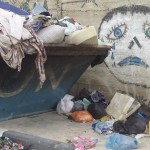
After 15 days living in Bethlehem, I hosted a couple of backpackers for the Eid holiday, Kyle and Kim. Kyle is a guy from Florida with lots of questions. He’s tall with shaggy hair and a resonating voice. He loves coffee. Kim is from Belgium. She’s quiet, short and looked gorgeous even after waking up from a nap with the friendly mosquitos that have taken over my apartment.
It was their first time in the West Bank and Kyle’s curiosity and frustration was apparent. His recent experience staying at a kibbutz left him with more questions and the sense that people didn’t want to talk about the conflict.
Feeling daunted by the task of answering all his questions fairly, I did what anyone else would do in this situation. I threw a dinner party with the few friends I have in Bethlehem: two Americans, a Canadian and a woman from Belgium.
We sat in the living room, ate creamy pasta, salad and garlic bread (made by slapping butter and freshly chopped garlic onto pita bread), drank Taybeh beer and chatted.
We talked about the hierarchical nature of ones status in Israel and the misery of the three-month tourist visa. This is issued by Israel because Palestine does not control its borders. Israeli border control cannot know that you’re living in the West Bank because they would deny you re-entry.
Kyle asked, “who’s to blame?†The resounding response was that no one party is to blame. It’s an awful situation influenced by so many countries and movements that it’s impossible to place blame anywhere.
Though the situation seems completely unsolvable, one of my dinner guests said that if international law were actually followed, a solution would be much more possible. Instead, Obama offers concessions to the Israeli government regarding settlements.
To the question “what will happen in the future?†all hands in the room went up in the air as everyone responded in near unison, “it’s impossible to say!â€
But they will keep working for peace. And Palestinians, like the non-violent resisters in Tuwani, will continue to do the same.
